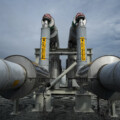The saintly editors here at The Hub have agreed to my request to produce one of my two monthly articles for the site as a monthly transatlantic diary. For those readers not familiar with the format, which is more common in British journalism, the diary is a grab bag of short items, sometimes on a common theme, but often not. In my case, what they have in common is that they are either too inconsequential to merit a full article or I can’t be bothered to come up with more than a knee-jerk reaction or a flip comment. This is August.
With apologies to Eliot, August is the cruellest month. It arrives so carelessly that you hardly notice the calendar has turned. Fall is still so far away and out of mind that the months seem to run together in one endless summer. Then just as you’ve exhaled and let down your guard, September is right smack in your face, throwing a long shadow across your days. After that there is a crispness in the evenings that wasn’t there before. In most of Canada, only the first two, or at most three, weeks of August are really summer. After that it is just a countdown to Labour Day and the return of responsibility. August is a con.
* * *
I spent most of the month Victoria, in a house a few minutes from where I grew up. I once tried to write about this neighbourhood, and specifically the maze of lanes between the houses. I wasn’t happy with result—too precious; too contrived—so I never published it, but I have been drawn again to the cool shade of the Oak Bay lanes by the August heat.
In that unpublished piece, I wrote that to travel by lanes is to see the world from an unexpected angle, somewhere behind or within it. The backs of houses are where children play unsupervised and intimate laundry hangs unattended. Lanes are part of an older way of life when the line between public and private was not clear, when everyone knew everyone’s business and no one came or went unseen.
As roads were paved and widened, lanes were left over as the forgotten paths between the lines on the map. They became associated with rural backwardness. The town of Lowick, George Eliot assures us in Middlemarch, “was not a parish of muddy lanes and poor tenants.”
Exactly a century later, Larkin included lanes among the endangered properties of the vanishing English countryside. His poem “Going, Going” was commissioned as a verse prologue to a 1972 U.K. government report on the human habitat called “How do you want to live?” The poem predicts a future England as the “First slum of Europe,” paved over and bricked in by developers with “spectacled grins.”
And that will be England gone,
The shadows, the meadows, the lanes,
The guildhalls, the carved choirs.
There’ll be books; it will linger on
In galleries; but all that remains
For us will be concrete and tyres.
Those British motorways, like the varicose highways expanding around Toronto as the bloated megacity strains at its greenbelt, are a new kind of lane fit for an age of speed. Bus lanes, bike lanes, slow lanes, and fast lanes, HOV lanes, change lanes, stay in your lane.
These new lanes are really anti-lanes. Not gentle paths between places but ribbons of asphalt laid out mechanically side by side by side, racing stripes impelling us across the country. Modern lanes are not worn by use over time. Lanes are now infrastructure, planned and plotted, the stuff of municipal budgets and federal grants, of deals between cities and the developers who run them. James Kunstler diagnosed the problem 30 years ago in The Geography of Nowhere. At the time, everyone nodded thoughtfully…and then went right on building more concrete sprawl enmeshed in more concrete highways.
The lanes of my childhood were decidedly of the older kind, pitted gravel tracks with selvages crumbling into long grass. They were out of sight and mostly out of mind, private places where we rode fast side by side, not watching for cars. In the summer we left white dust clouds behind us, and when it rained after a dry month the fine powder dust swallowed fat raindrops, releasing a perfume of grass clippings and sweet gasoline.

* * *
Not much has changed in Oak Bay since then, but I have noticed that the little houses where middle-class families and retirees used to live are slowly being replaced by larger modern units. Peaked roofs and gables are out of fashion; square lines and flat roofs are in. Done well with quality wood or stone, the modern style can be attractive. Unfortunately, most of the new houses are not—expensive, yes; tasteful, no. One by one the graceful curve of my seaside road is being lined by square boxes, like a street drawn by a particularly unimaginative or dull child. At least there are no tall condos, yet, but I imagine they are coming. They are certainly sprouting up downtown at a worrying pace.
* * *
One of the best things about being back in Oak Bay is the near total absence of politics. Compared to Alberta, where anger at Ottawa has defined provincial politics since at least the first Trudeau, British Columbians’ attitude towards Ottawa is a mix of indifference and ignorance. The Rocky Mountains are a powerful psychological barrier, and anything that does make it over the Rockies drowns in the Salish Sea before it reaches us. If Vancouver is Lotus Land, as Allan Fotheringham dubbed it, then Oak Bay is the Shire: a lush suburban haven happily oblivious to rumours of the outside world. Even local politics is almost non-existent—the mayor ran unopposed in 2022 and the most contentious issue in the two elections before that was the local deer cull. Don’t get me wrong: there is value in active civic politics, but quiescence has its benefits too. And as I try to milk what comfort I can from the last complacent days of August, I know which I prefer.
Recommended for You

The Weekly Wrap: We are still living in Justin Trudeau’s economy

Ben Woodfinden: Canada needs a change agent in charge. The same Liberal playbook won’t fix anything

The Notebook by Theo Argitis: Steel tariffs, sinking exports, and a frozen housing market

‘This was bound to happen’: The Roundtable on the Trump-Musk blowup and the journalistic challenges in critiquing the Carney government




